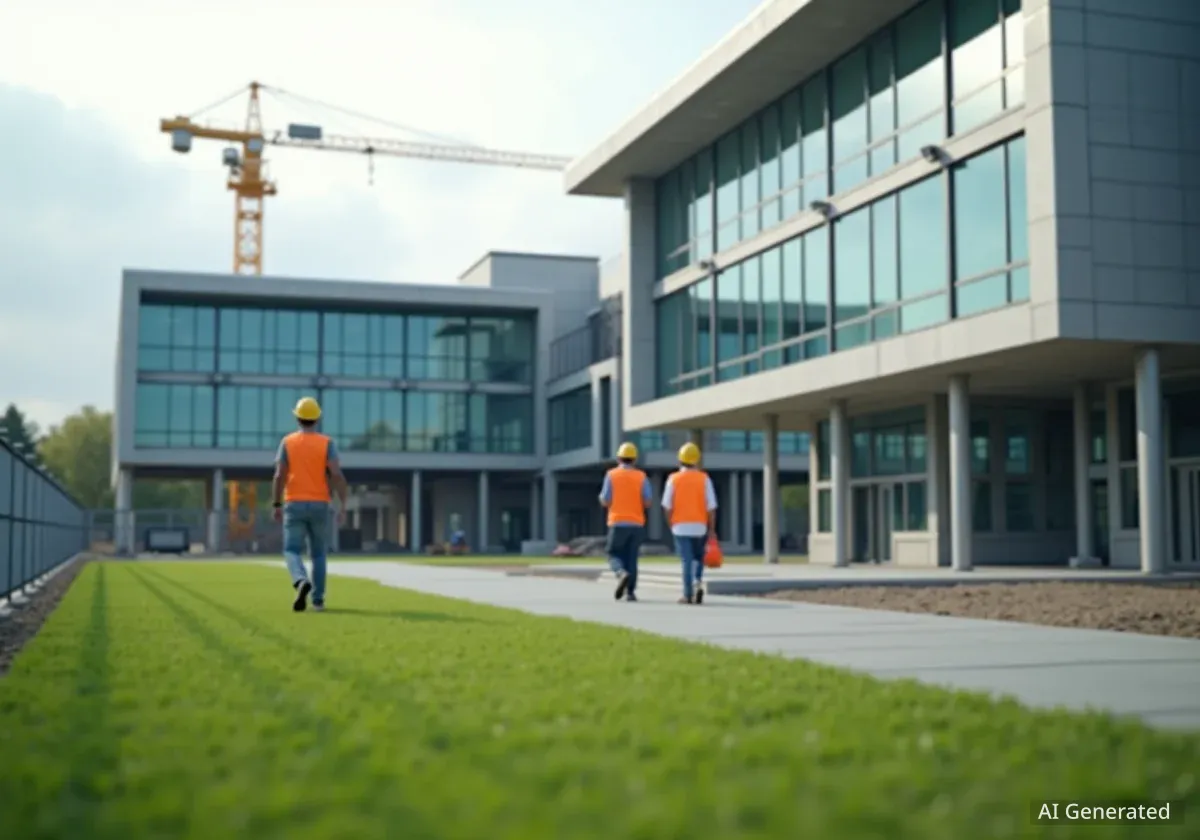Plans for a £58 million complete redevelopment of Mosslands School in Wallasey are progressing, with Wirral Council confirming it is actively working with the Department for Education to deliver the project. The ambitious scheme aims to replace the school's ageing facilities, some of which date back to 1952, with a modern, energy-efficient campus designed for 21st-century learning.
The update was provided during a recent education committee meeting, where officials outlined the significant benefits the new school will bring to students and the wider community. The project represents one of the largest single investments in educational infrastructure in the region in recent years.
Key Takeaways
- A £58 million plan to completely rebuild Mosslands School in Wallasey is moving forward.
- The project is funded by the Department for Education and managed in partnership with Wirral Council.
- The new school will feature a three-storey main building, a theatre, two sports halls, and extensive new sports pitches.
- Construction is planned in two phases, starting in autumn 2025 and aiming for full completion by summer 2028.
- The new energy-efficient design is projected to save over £160,000 annually in running costs.
Project Scope and Funding Confirmed
The comprehensive redevelopment of Mosslands School has been officially confirmed as a priority project, with an estimated cost of just under £58 million. This funding is provided by the Department for Education (DfE) as part of a national school rebuilding programme, targeting institutions with buildings in most need of replacement.
During an education committee meeting on September 22, Wallasey councillor Ian Lewis requested an update on the scheme, describing it as a "fantastic redevelopment" that was long overdue. His inquiry prompted a detailed response from the council, reassuring stakeholders of its commitment.
Labour councillor Stephen Bennett, who chairs the committee, described the initiative as a "once in a lifetime capital programme." He emphasized the long-term benefits for the local area.
"Officers are working positively with the planning agents and intend to report to the planning committee at the first appropriate available opportunity," stated Councillor Bennett, signaling that the formal planning process is advancing.
The council has been collaborating with both the school and the DfE for several years to bring the project to this stage. A formal planning application was submitted to the local authority earlier this year, and officials are now working through the necessary steps for approval.
New Facilities for Students and Community
The redevelopment will see the entire school site transformed. The current buildings, parts of which were constructed in 1952, suffer from significant issues such as leaking roofs and outdated infrastructure. These will be replaced with a state-of-the-art educational campus.
Projected Annual Savings
The new school's sustainable design, featuring enhanced insulation, solar panels, and a ground source heat pump, is expected to save at least £160,000 per year in operational and energy costs compared to the current facilities.
A Modern Learning Environment
The core of the project is a brand new, three-storey main school building. This will house modern classrooms and learning spaces designed to support a contemporary curriculum. In addition to the main building, the plans include several specialized facilities:
- A dedicated theatre for performing arts.
- Two modern sports halls and an accompanying fitness suite.
- An advanced engineering centre to support vocational and technical education.
- Purpose-built facilities for children with complex educational needs, ensuring better accessibility.
The outdoor spaces will also be completely overhauled. The plans feature a new junior pitch, netball courts, a full-size county-level sports pitch, and a separate pitch for under-12s. These improvements are designed to enhance the school's physical education provision and support grassroots sports.
Community Access
A key aspect of the redevelopment is ensuring the new facilities benefit the entire Wallasey community. Councillor Bennett highlighted that the new school's sports halls, theatre, and pitches will be made available for community use outside of school hours, creating a valuable local hub.
Phased Construction and Timeline
The project has been carefully planned to minimize disruption to current students and staff. The new school will be constructed on land to the south of the existing buildings. This strategy allows Mosslands to remain fully operational in its current facilities while the new campus is built.
The construction timeline is divided into two distinct stages:
- Stage One (Autumn 2025 - Spring 2027): This phase involves the construction of the new three-storey school building and associated core facilities.
- Stage Two (Spring 2027 - Summer 2028): Once the new building is complete, pupils and staff will move into the new school. The old school buildings will then be demolished. The final part of this stage includes the creation of a new car park, bike storage, and the completion of the remaining sports pitches on the cleared land.
If this timeline is met, the entire project is expected to be fully completed by the summer of 2028, delivering a completely revitalized campus for future generations of students.
Wider Educational and Community Issues
The education committee meeting also addressed other important topics affecting young people in Wirral. Councillors discussed the council's youth justice service, which was recently rated 'Good' by inspectors. Concerns were raised by Cllr Tony Murphy about the links between antisocial behaviour and organised crime, particularly in areas like Rock Ferry.
Officials reported that despite a recent increase in violent disorder, the youth justice programme has achieved notable successes. In the last year, the service successfully prevented 19 children from going to court and kept 12 children from being criminalised, with none of those individuals returning to the service.
The discussion also touched upon school attendance and substance misuse. In response to a query about ketamine use in schools, officers confirmed they are running an educational programme to inform children about the risks. School nurses have also received specialized training to identify and address issues linked to the drug.
Finally, the committee approved moving forward with plans for a new football pitch at Clare Mount Special Sports College in Leasowe. The costs for this separate project are expected to be covered by the sale of the college's former site on Fender Lane, subject to final approvals.





